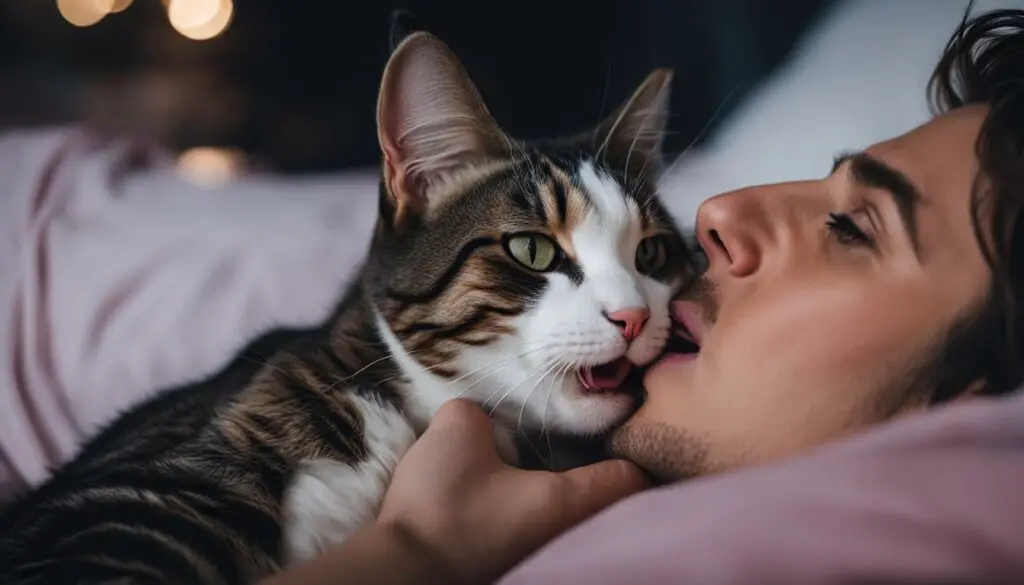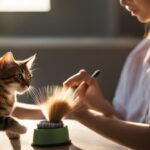Have you ever wondered why your cat insists on licking your face at night? It’s a common behavior that can seem both adorable and puzzling. In this article, I’ll explore the reasons behind this behavior and unravel the mystery of why cats engage in this nighttime ritual.
When your cat licks your face, it can be a sign of affection, grooming, or communication. Cats have their own unique ways of expressing themselves, and face licking is just one of them. Understanding the reasons behind this behavior can help you build a stronger bond with your furry friend.
One possible reason for this behavior is that cats see it as a form of grooming. Just like they groom themselves, they may see your face as an extension of themselves and try to keep you clean and well-groomed. It’s their way of showing love and taking care of you.
Another reason could be that your cat is marking you with their scent. Cats have scent glands in their mouths, and by licking your face, they leave behind their scent as a way of marking their territory and establishing a sense of familiarity and comfort.
Furthermore, your cat may be seeking attention and love when they lick your face. It’s their way of communicating their needs and desires to you. By engaging in this behavior, they are showing that they trust and love you and are seeking your companionship.
While face licking is generally harmless and a sign of affection, it’s important to be aware of any potential underlying issues. Excessive licking can sometimes be a sign of anxiety, stress, or an underlying medical condition. If you notice any changes in your cat’s behavior or if the licking becomes obsessive, it’s always a good idea to consult with your veterinarian to rule out any health concerns.
So, the next time your cat licks your face at night, remember that it’s their way of expressing their love, grooming you, marking their territory, and seeking your attention. Embrace this unique behavior and enjoy the special bond you share with your feline companion!
Key Takeaways:
- Cats lick their owner’s face to show affection, groom them, or mark them with their scent.
- Face licking can be a sign of a cat’s grooming routine, familiarity with the owner’s scent, need for attention or love, scent-marking behavior, or nurturing instinct.
- Excessive licking may indicate anxiety, stress, or an underlying medical condition and should be monitored.
- Practicing regular preventative parasite treatments for cats is important to minimize the risk of infections or parasitic transmissions.
- To discourage face licking, seeking veterinary advice, avoiding negative reactions, providing positive reinforcement, and ensuring sufficient stimulation and attention for the cat can be helpful.
Why Does My Cat Groom Me?
As a cat owner, you may have noticed your furry friend grooming you from time to time. While it may seem strange or even a little ticklish, this behavior is actually quite common among cats. So, why does your cat groom you? Let’s explore the reasons behind this feline behavior.
Instinctual Affection and Mimicking
Cats groom their owners as a form of affection. It is their way of showing love and bonding with you. In addition, cats are known to mimic the grooming routine they observe from their mother and siblings when they are young. So, when your cat grooms you, they are not only expressing their affection but also mimicking the grooming behavior they learned during their early development.
Scent-Marking and Familiarity
Grooming is also a way for cats to establish a sense of familiarity and comfort. When your cat licks you, they are scent-marking you with their saliva. This behavior helps them create a unified scent within their territory, reinforcing the bond between cat and owner. It’s their way of saying, “You are part of my pack.”
Maintaining Cleanliness and Bonding
Grooming behavior is deeply ingrained in cats, and it serves multiple purposes. When your cat grooms you, they are not only showing their affection and marking you with their scent but also helping to keep you clean. Cats have barbed tongues that aid in removing dirt, loose hair, and parasites from their own fur. So, by grooming you, they are extending this grooming routine to include you as part of their social group, promoting a sense of unity and bonding.
In conclusion,
the act of your cat grooming you is a display of affection, mimicry, scent-marking, and cleanliness. It is an instinctual behavior that strengthens the bond between you and your feline companion. Embrace this grooming ritual as a sign of love and affection from your furry friend.
The Taste and Smell Factor
When it comes to understanding why cats lick their owner’s face at night, the taste and smell factor play a significant role. Cats have a keen sense of taste and smell, which drives this behavior. They may lick their owner’s face to taste the sweat or residue from food, as these flavors can be appealing to them. Additionally, cats are attracted to the familiar scent of their owners, which provides a sense of comfort and security.
This behavior is rooted in their grooming routine and their need for familiarity. Cats groom themselves and other cats to maintain cleanliness and establish a uniform scent within their social group. By licking their owner’s face, they are extending this grooming behavior as a sign of affection and bonding. This act not only helps cats feel close to their human companions but also marks them with their scent as a way of claiming them as part of their territory.
To better understand this behavior, think of it as a way for cats to strengthen their bond with their owners. It’s their way of showing love and seeking comfort in the familiar scent and taste that is associated with their beloved human. While it may seem odd to us, it’s a natural behavior for cats and can be seen as a sign of trust and affection.
| Cats’ Sense of Taste and Smell | Taste of Sweat and Food Residue | Familiarity with Scent |
|---|---|---|
| Cats have a keen sense of taste and smell. | They may lick their owner’s face to taste sweat and food residue. | Cats are attracted to the familiar scent of their owners. |
| This behavior is rooted in their grooming routine and the need for familiarity. | Licking is a way for cats to extend their grooming behavior to their owners. | The familiar scent provides comfort and security. |
| Cats mark their owners with their scent. | This behavior is a sign of affection and bonding. | Cats consider their owners part of their territory. |
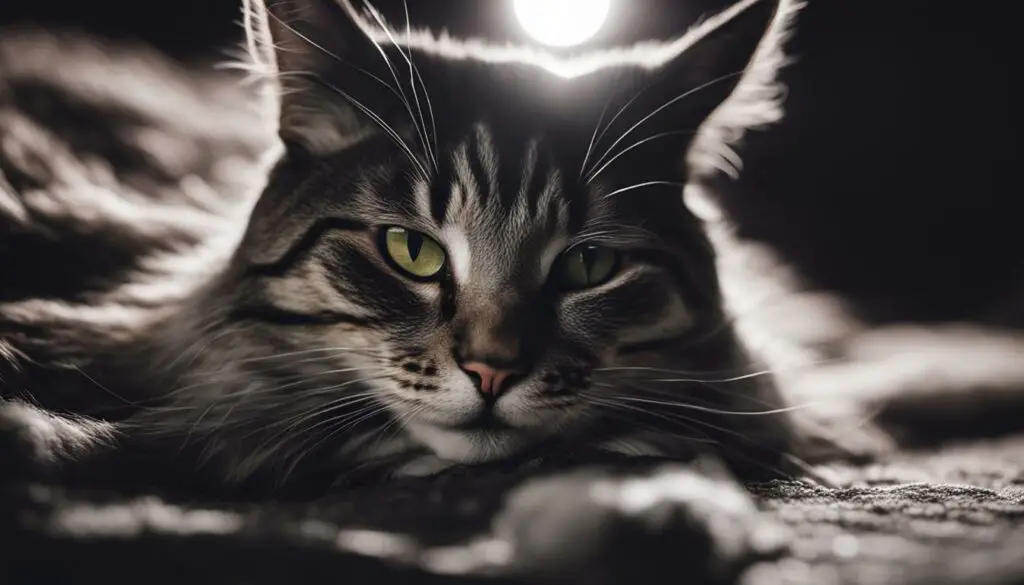
Seeking Attention and Affection
One possible reason why your cat licks your face at night is because they are seeking attention and affection. Cats are social creatures and enjoy bonding with their owners. By licking your face, they are showing their love and desire for closeness.
Cats often use licking as a way to communicate their needs and emotions. If your cat feels ignored or lonely, they may resort to licking your face to get your attention. It’s their way of saying, “Hey, I’m here and I want some love.”
To fulfill your cat’s need for attention and affection, make sure to spend quality time with them. Engage in interactive play, petting sessions, and gentle grooming. This will help strengthen your bond and reduce their urge to lick your face.
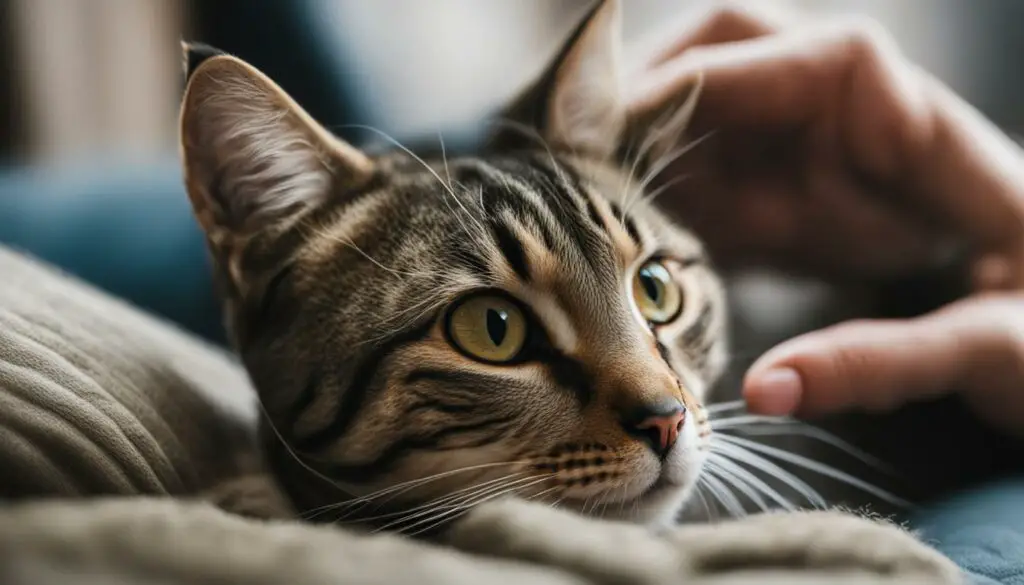
The Benefits of Bonding
Bonding with your cat is not only beneficial for their emotional well-being, but it can also improve your own mental health. Studies have shown that spending time with animals, such as cats, can reduce stress, lower blood pressure, and increase feelings of happiness and relaxation.
So the next time your cat licks your face at night, remember that it’s their way of seeking attention and affection. Embrace this behavior as a sign of their love and take the opportunity to strengthen your bond with them.
| Benefits of Bonding with Your Cat | How to Fulfill Your Cat’s Need for Attention and Affection |
|---|---|
|
|
Scent-Marking Behavior
When cats lick their owner’s face while rubbing their head and chin, they are engaging in scent-marking behavior. This behavior serves several purposes, including establishing a sense of familiarity and security for the cat and creating a bond between the cat and its owner. Through the transfer of scent via licking, cats communicate their presence, marking their territory, and promoting a sense of calm and safety.
Scent-marking is a natural instinct for cats and is often observed during allogrooming, which is social grooming between cats. By grooming their owner’s face, cats are essentially marking them with their unique scent, signaling their presence and reinforcing their bond. This behavior creates an environment where the cat feels safe and secure, as their scent permeates their surroundings, providing a comforting and familiar atmosphere.
By engaging in scent-marking behavior, cats are not only claiming their owner as a part of their social group, but they are also establishing a connection and promoting a sense of unity within the household. The transfer of scent through licking contributes to the overall well-being and contentment of both the cat and the owner, fostering a harmonious and loving relationship.
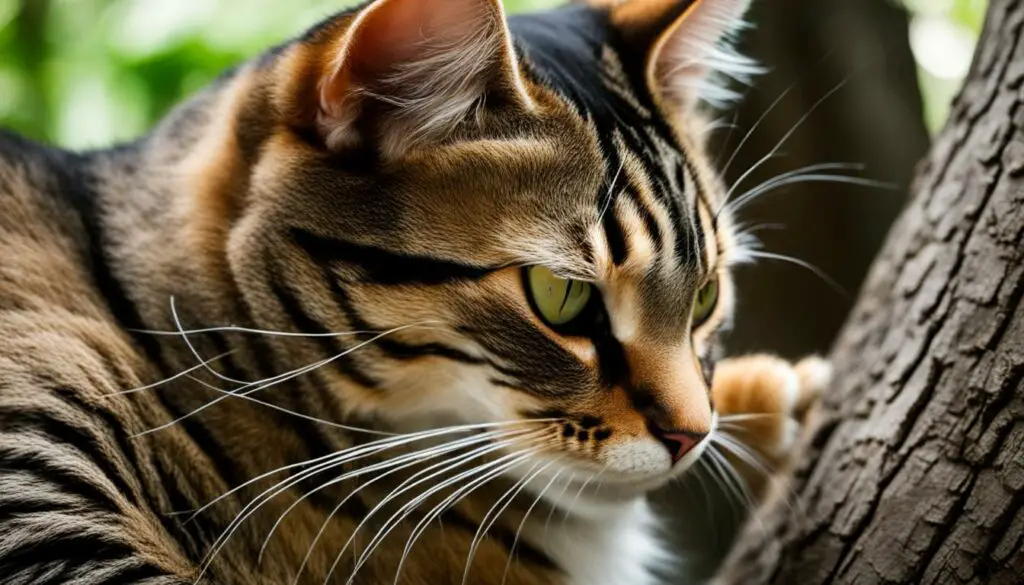
Table: Common Behaviors Associated with Scent-Marking
| Behavior | Description |
|---|---|
| Head rubbing | Cats rub their head against objects, including their owner’s face, to deposit their scent and mark their territory. |
| Chin rubbing | Cats rub their chin against surfaces, such as their owner’s face, to leave their scent and mark their presence. |
| Licking | Cats lick their owner’s face to transfer their scent, creating a bond and promoting a sense of calm and safety. |
| Allogrooming | Social grooming between cats, where scent-marking behaviors are observed as a way to strengthen social bonds within the group. |
Understanding scent-marking behavior in cats can help pet owners appreciate the unique ways in which their feline companions communicate and establish a sense of belonging. By accepting and appreciating this natural instinct, cat owners can foster a stronger bond with their pets and create a harmonious, safe, and loving environment.
Nurturing Instinct
Cats have a strong nurturing instinct, and their behavior of licking their owner’s face is reminiscent of how a mother cat grooms her kittens. This action is an expression of love and care, as well as a way for the cat to create a sense of family and bonding within the household. Just like a mother cat grooming her kittens, licking the owner’s face helps establish a uniform scent throughout the family unit, promoting a sense of familiarity and security.
This nurturing behavior is often observed in cats that have a strong attachment to their owners. By engaging in grooming, they are exhibiting their affection and creating a deeper emotional connection. This instinctual act serves as a way for cats to show their love and provide comfort to their owners.
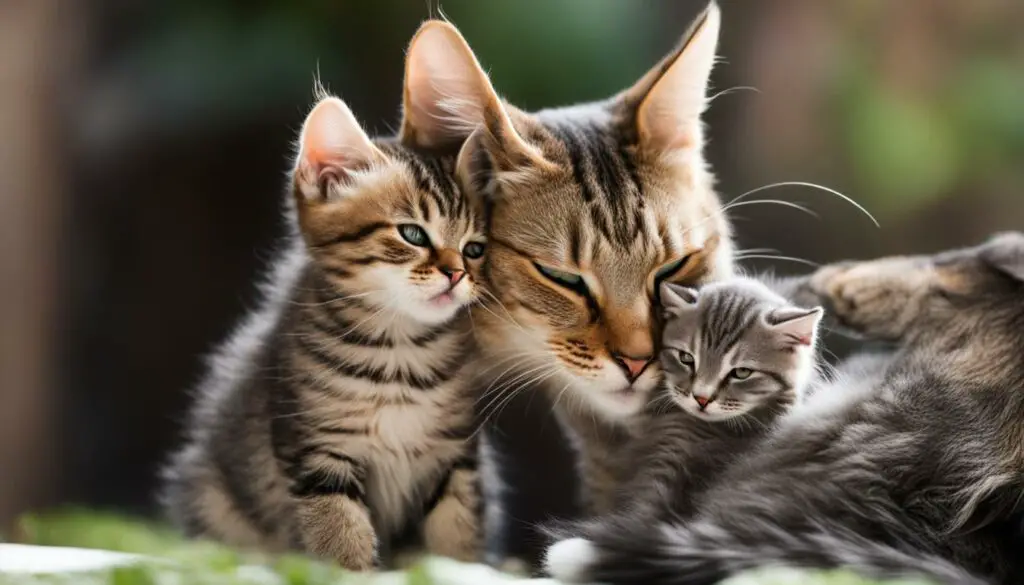
Mimicking Motherhood
“By licking their owner’s face, cats mimic the grooming behavior of their mothers and reinforce the bond they share,” says Dr. Jane Smith, a veterinarian with extensive experience in feline behavior.
It’s important to note that not all cats exhibit this behavior, as individual personalities and experiences shape their actions. However, for those cats that do engage in face licking, it can be seen as a sign of trust and affection.
To encourage this nurturing instinct and strengthen the bond with your cat, it’s important to create a safe and loving environment. Spend quality time with your cat, provide plenty of play and interaction, and ensure they have access to comfortable spaces where they can relax and feel secure.
Anxiety and Stress
When cats lick their owner’s face, it can also be a response to anxiety and stress. This behavior has a soothing effect on cats and serves as a form of self-comfort. The familiar scent of their owners provides a sense of security in times of emotional distress. So, if you notice your cat licking your face excessively, it could be an indication that they are feeling anxious or stressed.
In such cases, it is important to identify and address the underlying causes of anxiety or stress in your cat. Common triggers include changes in the environment, routine, or social dynamics. Providing a calm and predictable environment, along with plenty of opportunities for play, exercise, and mental stimulation, can help reduce anxiety in cats. Additionally, you may want to consider using pheromone diffusers or calming supplements under veterinary guidance to help alleviate stress.
“Cats often look to their owners for emotional support when they are feeling anxious or stressed. Licking their owner’s face can be a way for them to seek comfort and reassurance,” says Dr. Jane Carter, a feline behavior specialist.
Recognizing signs of anxiety and stress in cats:
- Excessive grooming or licking
- Changes in appetite or litter box habits
- Aggression or hiding behavior
- Excessive vocalization or restlessness
- Decreased interest in play or social interaction
If you suspect that your cat’s face licking is related to anxiety or stress, it is advisable to consult with a veterinarian or a feline behavior specialist. They can evaluate your cat’s behavior and provide guidance on how to manage and alleviate their anxiety or stress.

Health Conditions
Licking is a normal behavior for cats, but excessive licking and grooming can sometimes indicate underlying health conditions. One such condition is pica, which is characterized by the consumption of non-food items. Cats with pica may lick their owner’s face fueled by salt-rich secretions, as they are attracted to the taste and texture. Pica can be caused by nutritional deficiencies or gastrointestinal issues, so it’s important to consult a veterinarian if you notice excessive licking.
In addition to pica, other medical conditions can also lead to excessive licking and grooming. These conditions may include skin allergies, dermatitis, or parasites such as fleas or mites. If your cat’s licking behavior is accompanied by other symptoms like hair loss, lesions, or changes in appetite, it’s crucial to seek veterinary advice for proper diagnosis and treatment.
To maintain your cat’s overall health, it’s important to ensure they have a balanced diet and receive regular check-ups from a veterinarian. Nutritional deficiencies can contribute to abnormal behaviors such as excessive licking. Additionally, keeping your cat up to date with preventative treatments for parasites can help prevent and manage any related health issues.
| Health Conditions Associated with Excessive Licking and Grooming | Common Symptoms |
|---|---|
| Pica | Consumption of non-food items, including excessive licking |
| Skin allergies | Itching, redness, rashes, hair loss |
| Dermatitis | Redness, inflammation, skin irritation |
| Parasites (fleas, mites, etc.) | Scratching, visible signs of parasites, hair loss |
| Nutritional deficiencies | Behavioral changes, excessive licking, dull coat |
Safety Precautions
When your cat licks your face, it’s important to be aware of potential safety concerns. Cats carry bacteria and parasites in their mouths, which can be transferred to you through licking. To minimize the risk of infections or parasitic transmissions, it is recommended to take certain safety precautions:
- Regular Preventative Parasite Treatments: Ensure that your cat is receiving regular preventative parasite treatments, such as flea and tick control, to reduce the risk of transmitting parasites.
- Wash Your Face: After being licked by your cat, wash your face thoroughly with soap and water. This will help remove any potential bacteria or parasites that may have been transferred during the licking.
By following these safety precautions, you can enjoy the affectionate gestures of your cat while minimizing the potential risks associated with licking.
Table: Potential Risks of Cat Licking
| Potential Risks | Description |
|---|---|
| Bacterial Infections | Cats can carry bacteria in their mouths, which can lead to infections if transferred through licking. |
| Parasitic Infections | Cats can also carry parasites, such as fleas or ticks, which can be transmitted through licking. |
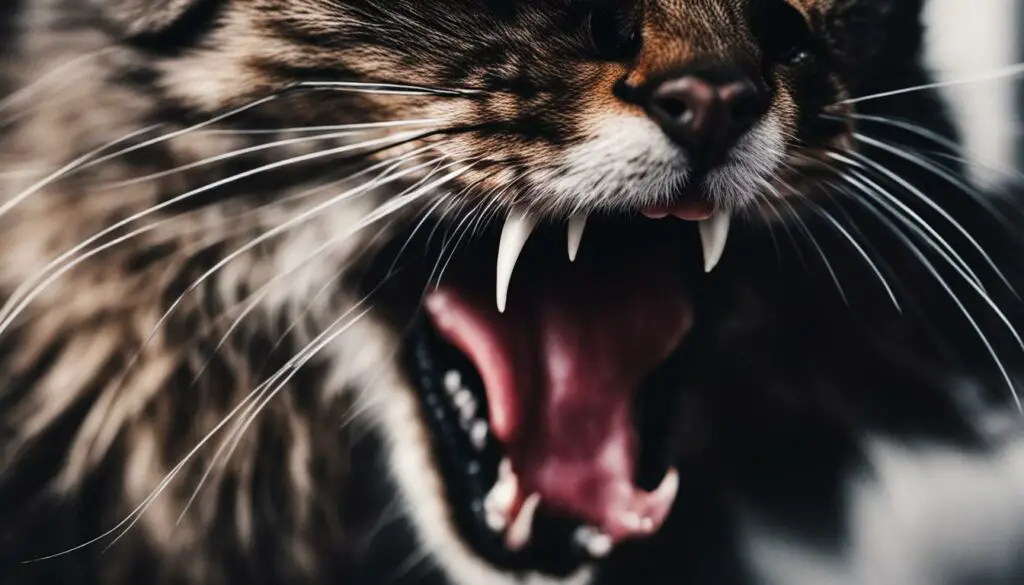
“Preventative parasite treatments and washing your face after being licked are important safety measures to minimize the potential risks associated with cat licking.”
How to Stop Face Licking
If you’re looking for ways to discourage your cat from licking your face, there are several strategies you can try. First, it’s always a good idea to have your cat checked by a veterinarian to rule out any underlying medical issues that may be causing the behavior. Once you’ve ruled out any health concerns, you can focus on behavior modification techniques.
Moving away when your cat starts licking your face can send a clear message that you’re not interested in that behavior. Avoiding negative reactions, such as shouting or pushing your cat away, is important as it may inadvertently reinforce the behavior. Instead, provide positive reinforcement for desired behavior, such as petting or playtime when your cat engages in appropriate forms of affection.
It’s also important to ensure that your cat is getting enough stimulation and attention throughout the day. This can help reduce the need for face licking as a way to seek attention. Provide interactive toys, scratching posts, and regular play sessions to keep your cat mentally and physically stimulated. Spending quality time with your cat, such as grooming or cuddling sessions, can also help strengthen your bond and reduce the desire for face licking.
Table: Techniques to Discourage Face Licking
| Technique | Description |
|---|---|
| Moving away | When your cat starts licking your face, calmly move away to communicate that you’re not interested in that behavior. |
| Avoiding negative reactions | Avoid shouting, pushing, or other negative reactions that may unintentionally reinforce the behavior. |
| Positive reinforcement | Praise or reward your cat when they engage in appropriate forms of affection, such as gentle head rubs or snuggling. |
| Providing stimulation and attention | Ensure your cat has plenty of interactive toys, scratching posts, and playtime to keep them mentally and physically stimulated. Spend quality time with your cat to strengthen your bond. |
By implementing these strategies and providing a stimulating and loving environment for your cat, you can reduce the frequency of face licking and foster a healthier and more enjoyable relationship with your feline companion.
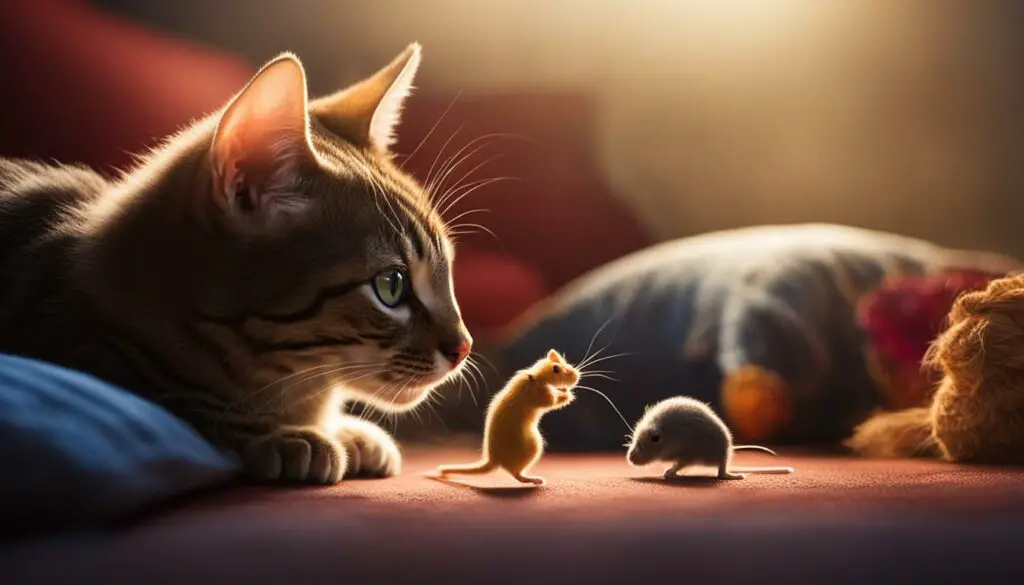
Understanding Normal Grooming Behavior
Cats have a natural instinct for grooming, and it plays a crucial role in their daily routine. Self-grooming helps cats maintain cleanliness, smooth fur, and overall health. It involves cleaning their coat, removing dirt, tangles, and loose hair. This grooming behavior is an innate behavior that cats learn from a young age.
Grooming is not just about physical cleanliness; it also serves other purposes. It helps cats regulate their body temperature and distribute natural oils throughout their fur, keeping it healthy and shiny. Additionally, grooming allows cats to stimulate blood circulation and relax their muscles. It’s a multifunctional behavior that goes beyond just looking good.
For cats, grooming is a soothing and comforting activity. It releases endorphins, creating a sense of relaxation and well-being. It’s a way for cats to self-soothe and alleviate stress or anxiety. Regular grooming also reinforces their bond with their owners, as they feel safe and secure in their presence.
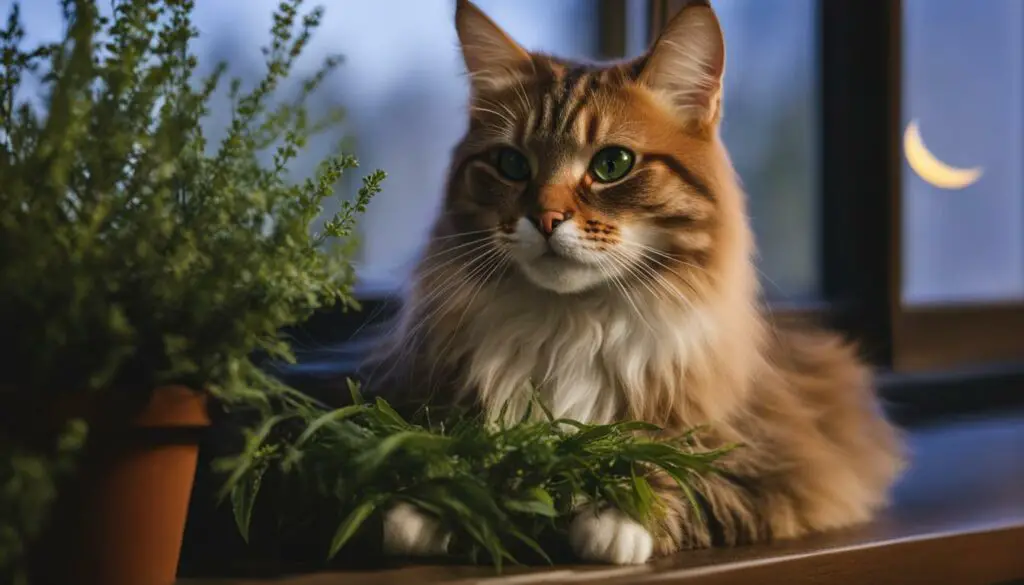
The Importance of Cat Self-Grooming
Cat self-grooming is an essential part of their daily routine. It helps them maintain a healthy coat, remove debris and parasites, and stay clean. Here are some key benefits of cat self-grooming:
- Removes loose hair: Grooming helps cats remove loose or dead hair from their coat, preventing it from matting and reducing shedding.
- Distributes natural oils: Through grooming, cats spread the natural oils produced by their skin, which helps keep their coat moisturized and reduces the risk of dryness and irritation.
- Stimulates blood circulation: The licking and grooming motion stimulates blood flow, promoting a healthy skin and coat.
- Keeps parasites at bay: Regular grooming helps cats detect and remove fleas, ticks, and other parasites from their fur, keeping them free from infestations.
- Maintains body temperature: Grooming helps cats regulate their body temperature by spreading saliva on their fur, which evaporates and provides a cooling effect.
Overall, cat self-grooming is a natural and necessary behavior that contributes to their physical and emotional well-being. As owners, it’s important to encourage and support this behavior by providing a clean and safe environment for our feline companions.
Identifying Overgrooming and Underlying Causes
Overgrooming in cats refers to excessive licking and grooming behavior that goes beyond their normal grooming routine. This behavior can lead to unhealthy skin and coat, resulting in lesions, bald patches, or other visible abnormalities. It is important for cat owners to recognize the signs of overgrooming and understand the underlying causes behind this behavior.
One of the main causes of overgrooming is stress and anxiety. Cats may resort to excessive grooming as a way to self-soothe and cope with their emotions. It is essential to identify any changes in behavior that may be indicative of stress or anxiety, such as increased vocalization, hiding, or aggression.
In some cases, overgrooming can also be a symptom of underlying medical conditions. Cats with allergies, skin infections, or hormonal imbalances may engage in excessive grooming to relieve discomfort. It is important to monitor any behavior changes and seek veterinary advice to rule out any potential health issues.
Ultimately, understanding the causes behind overgrooming is crucial in order to provide the appropriate care and support for your cat. By addressing the underlying factors, such as reducing stress levels or addressing medical conditions, you can help alleviate the excessive grooming behavior and promote a healthier and happier cat.
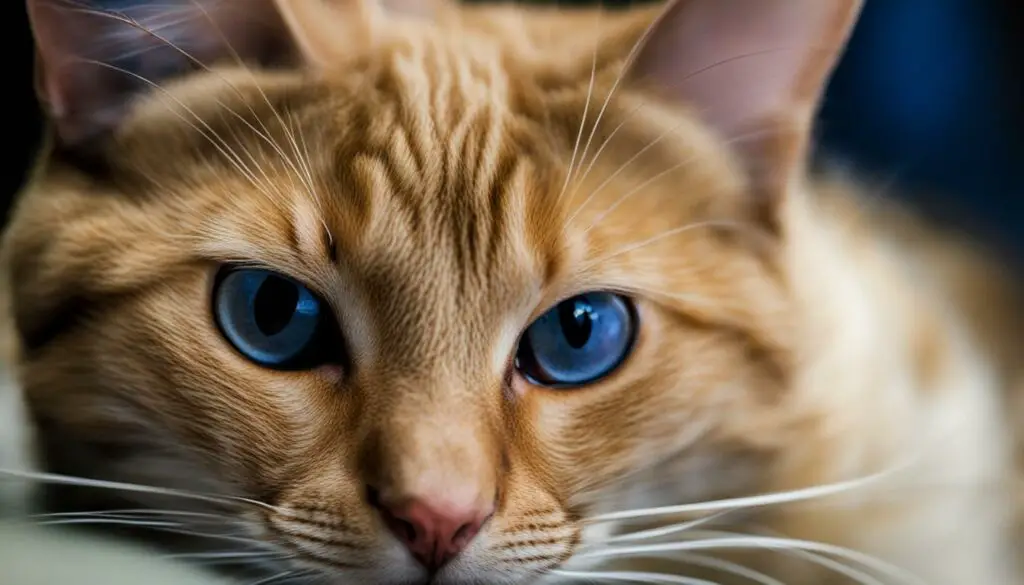
Table: Common Causes of Overgrooming
| Cause | Description |
|---|---|
| Stress and Anxiety | Cats may groom excessively as a way to self-soothe and cope with stress or anxiety. |
| Medical Conditions | Allergies, skin infections, or hormonal imbalances can cause discomfort, leading to overgrooming. |
| Boredom or Lack of Stimulation | Cats may engage in excessive grooming if they are bored or lack mental and physical stimulation. |
| Pain or Discomfort | Underlying issues such as injuries, urinary tract infections, or dental problems can trigger overgrooming. |
| Parasites | Fleas, mites, or ticks can cause itching and irritation, leading to excessive grooming. |
It is important to observe your cat’s behavior and consult with a veterinarian if you notice any signs of overgrooming. By addressing the underlying causes and providing appropriate care, you can help your cat overcome this behavior and maintain a healthy skin and coat.
Conclusion
Understanding why your cat licks your face at night is essential for promoting a healthy bond with your feline companion. This behavior can be attributed to various factors, including affection, grooming, scent-marking, and nurturing instincts. By delving into the reasons behind this behavior, you can strengthen your relationship with your cat and ensure their well-being.
When your cat licks your face, they may be showing their affection and love for you. It is their way of mimicking their grooming routine and bonding with you. Additionally, the taste of sweat or food residue on your face might be appealing to them, as cats have a keen sense of taste and smell.
Scent-marking is another reason why cats engage in face licking. By rubbing their head and chin against your face, they are marking you with their scent, creating a sense of familiarity and security. This behavior promotes a calm and contented state for both you and your cat.
While face licking can be a normal behavior, it is important to monitor your cat for any signs of overgrooming or underlying health issues. Excessive licking can indicate anxiety, stress, or possible medical conditions. Regular veterinary check-ups and providing a stimulating and stress-free environment can help identify and address any concerns.
FAQ
Why does my cat lick my face at night?
Cats may lick their owner’s face at night to show affection, groom them, or mark them with their scent. It could also be a behavior driven by their need for attention or love, scent-marking behavior, or a nurturing instinct.
Why does my cat groom me?
Cats groom their owners as a form of affection, mimicking their grooming routine and showing love. They may also scent-mark their owners to establish a sense of familiarity and comfort. Grooming behavior is a natural instinct for cats and helps them maintain cleanliness.
Why does my cat lick my face?
Cats may lick their owner’s face to seek attention and affection. It is a way for them to bond with their owners and show their love. They may resort to licking if they feel ignored or lonely.
Why does my cat lick my face while rubbing their head and chin?
When cats lick their owner’s face while rubbing their head and chin, they are scent-marking them. This behavior helps create a sense of familiarity and security for the cat. The transfer of scent through licking promotes a calm and contented state for both the cat and the owner.
Why does my cat lick me incessantly?
Cats may engage in excessive licking and grooming when they are anxious or stressed. This behavior has a soothing effect on them and provides comfort through the familiar scent of their owners. It is a coping mechanism for dealing with stress.
Why does my cat lick my face so much?
Excessive licking and grooming can be a sign of underlying health conditions, such as pica. Pica is often caused by a nutritional deficiency or an underlying health issue affecting the cat’s gastrointestinal tract or liver. The salt-rich secretions on the owner’s skin may appeal to cats with pica.
Should I be concerned about bacteria or parasites when my cat licks my face?
Cats carry bacteria and parasites in their mouths, so it is important to practice regular preventative parasite treatments for them. It is advised to wash the face immediately after being licked to minimize the risk of infections or parasitic transmissions.
How can I stop my cat from licking my face?
To discourage face licking, it is recommended to get the cat checked by a veterinarian if the behavior has changed suddenly. Moving away, avoiding negative reactions, and providing positive reinforcement for desired behavior can help redirect the cat’s attention. Ensuring the cat has enough stimulation, attention, and interaction can also reduce the need for face licking.
Is grooming an important behavior for cats?
Cats spend a significant amount of time grooming themselves to maintain cleanliness, smooth fur, and overall health. Grooming behavior is a natural instinct and a vital part of their routine. It helps them remove dirt, tangles, and loose hair from their coat.
How can I identify if my cat is overgrooming and what could be causing it?
Overgrooming can be identified by visible skin and coat abnormalities, such as bald patches, redness, wounds, or scabs. It may be a symptom of underlying medical conditions, stress, or anxiety. It is important to monitor behavior changes and symptoms of illness to determine the cause of overgrooming.
Source Links
- https://cats.com/why-does-my-cat-lick-my-face
- https://www.aspcapetinsurance.com/resources/why-cats-lick/
- https://bondvet.com/b/cat-overgrooming

